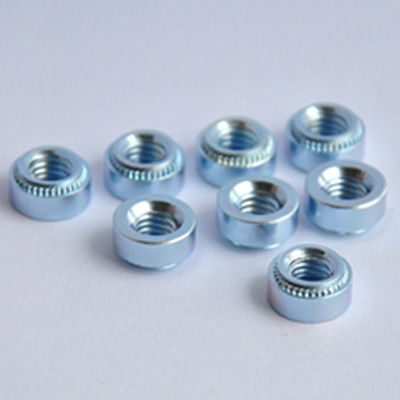Clinch Nuts, also known as Self-clinching Nuts or press-fit nuts, are special fasteners commonly used in the manufacturing industry. They are designed to be permanently installed directly into a sheet metal or panel, providing a reliable and load-bearing thread for mating screws or bolts. Clinch nuts are made from various materials depending on the application requirements and desired properties. Here are some commonly used materials for clinch nuts:
1. Steel: Carbon steel is a popular choice for clinch nuts due to its strength and cost-effectiveness. It offers good resistance to corrosion and can be easily plated or coated for added protection. Stainless Steel, which contains chromium for enhanced corrosion resistance, is also used for applications requiring higher resistance to rust.
2. Aluminum: Aluminum clinch nuts are lightweight and have excellent corrosion resistance. They are commonly used in industries where weight reduction is crucial, such as aerospace and automotive applications. Aluminum clinch nuts are also non-magnetic, making them suitable for certain electronic devices.
3. Brass: Clinch nuts made of brass are known for their excellent electrical conductivity and reliability. They are often used in electrical and electronic equipment, providing a secure threaded insert for screws or bolts. Brass clinch nuts also offer high corrosion resistance.
4. Stainless steel: Apart from stainless steel mentioned earlier, there are specific stainless steel alloys like 300 series stainless steel (such as 303 or 316), which are used for environments requiring even higher corrosion resistance or specific characteristics.
The selection of material for clinch nuts depends on factors such as the environment they will be exposed to, load-bearing requirements, desired thread strength, and overall project specifications. manufacturers can provide guidance on the most suitable material based on the application's needs.
It's worth noting that clinch nuts rely on the mechanical deformation and embedding of the host material to create a secure fastening. Therefore, the compatibility of the clinch nut material and the workpiece material is essential to ensure proper performance and durability of the joint.
